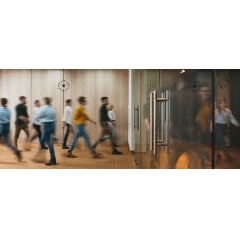Office real estate and Covid-19: three main lessons to learn
Real estate, like many other sectors, has been highly impacted by the global health crisis. What changes can we anticipate in the office real estate market? Find out thanks to the latest BNP Paribas Real Estate TrendBook, special Covid-19 edition.
1. Tenant companies and investors are taking a hit, but fundamentals remain strong
Despite short-term financial pressures, tenants and landlords have had to work together. As an example of the solutions implemented to support them, BNP Paribas Real Estate Ireland restructured the rental leases in an area of Dublin, offering tenants rent relief in exchange for contract extensions.
The investors’ projects remain relatively stable despite the sector decline. 50% [1] of investors surveyed by BNP Paribas Real Estate report that they are continuing with their investment projects. The number of transactions completed at pre-Covid prices during lockdown reflects confidence in a market that, being under capacity overall, appears unlikely to be conducive to a significant reduction in prices.
- Decrease in premium values of around 1-3% in Europe over the year.
-
Average increase of 5.9% in vacation rates in the 15 main European markets, i.e. +40 bps (basis points) compared to 2019.
-
Falling up-take for offices in European markets: -12% in Amsterdam, -32% in Dublin, -34% for the German “Big Four”, -46% in Paris and -48% in Central London.
-
A 45% decline in commercial real estate investment volumes (although investment volume is expected to remain twice as high as during the 2009 financial crisis)
-
Only +10 bps increase in prime yields for offices expected for 2020.
2. Remote working: a health necessity rather than a new standard
Although there has been some positive response to the widespread experience of remote working, neither companies nor employees are calling for “full remote”, or 100% remote working.
Major groups such as IBM, Google and Microsoft, having embarked on the “100% remote” venture, have scaled this back for such reasons as preserving company cohesion, motivation, onboarding, etc.
- 56% of respondents said they had worked as well (or better) remotely, compared to 34% who disagreed.
-
83% called for a massive expansion of remote working.
-
65% believed that this development would allow employees to live where they want.
-
59% of employees felt that this geographic dispersion would be a real threat to the spread of corporate culture.
-
38% of the workforce wanted to return to the pre-lockdown presence rate.
-
32% were in favor of an in-between solution.
-
32% cited the material conditions of the workplace as a reason for returning to the office, and 31% cited the desire to see their colleagues again.
These statistics echo other international studies on working remotely, with 62% of employees surveyed saying they are more focused on their work, but 57% expressing a desire to meet face-to-face.
3. The future is hybrid and fluid spacesWhile a reduction in workspace can indeed be expected for small businesses looking for savings, the office remains a fundamental part of a company’s identity. As a “flagship” and an embodiment of corporate image, the office plays a key role in terms of employer branding in attracting and retaining talent.
It is therefore essential to think about the different uses of user-friendly, productive and modular hybrid spaces rather than a simple balance between remote and on-site work.
“I am convinced that the office building will retain a central place, but it will increasingly resemble a cross-functional and modular business hotel that coworking and remote working will simply complement,” explains Éric Siesse, Deputy Managing Director, Head of Lettings, BNP Paribas Real Estate Paris.
Faced with the likely increase in demand for flexible leases and owner-managed category A+ spaces, BNP Paribas Real Estate has thus proposed a new offer in England to rationalize the relocation of occupants, thereby reducing rental vacancy costs. The Property Management and Investment Management teams (BNP Paribas REPM and REIM) provided extensive support to their clients again this year to help them find the most suitable solutions.
Similarly, the “Now Connected” offer developed with Now Coworking and BNP Paribas Real Estate proposes pioneering modular and reversible layouts.
We are entering a new era. Thinking collectively is therefore necessary to identify concrete operational responses. Interviews with experts and international professionals, analyses and examples: the new BNP Paribas Real Estate TrendBook provides the ideal support for implementing an agile and resilient real estate strategy.
-----
[1] Study carried out by BNP Paribas Real Estate on a sample of 131 investors and/or owners in commercial real estate, clients or prospects, over the period from May 12 to 26, 2020.
[2] Figures BNP Paribas Real Estate - At a glance Q3 2020, Main office market in Europe & BNP Paribas Real Estate - International Research Department at the date of publication of the Trend Book Special “The Effects of Covid-19 #1”.
[3] IFOP study carried out for BNP Paribas Real Estate with a representative sample of the French population aged 18 years old and more than 1,501 people interviewed from April 28 to 29, 2020.
( Press Release Image: https://photos.webwire.com/prmedia/6/269115/269115-1.jpg )
WebWireID269115
This news content was configured by WebWire editorial staff. Linking is permitted.
News Release Distribution and Press Release Distribution Services Provided by WebWire.
